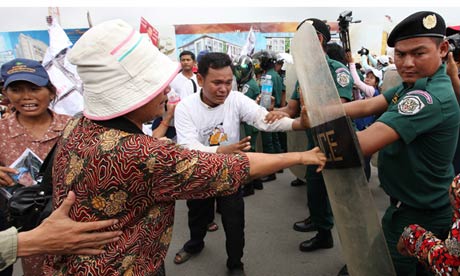"Today's
verdict only serves to demonstrate, yet again, that the courts in
Cambodia have been increasingly used as a tool for repression," the
International Federation for Human Rights said in a statement.
Activists condemn jailing of 71-year-old Sonando as court finds him guilty of plot to overthrow the government

Cambodian police clash with protesters outside the Phnom Penh court where Sonando was on trial. Photograph: Mak Remissa/EPA
A Cambodian court has jailed a 71-year-old broadcaster and land rights
campaigner for 20 years after finding him guilty of leading an
anti-state rebellion, a verdict condemned by activists as the latest
crackdown on human rights.
Three judges at the Phnom Penh court convicted Sonando, who has joint Cambodian-French citizenship, and 13 others of inciting villagers in eastern Kratie province to rebel against the government.
The long-time rights campaigner and critic of the prime minister, Hun Sen, stood accused of inciting villagers to take up arms and of aiming to recruit up to a million people to topple the government.
Hun Sen urged in a nationally broadcast speech in June that Sonando be arrested for masterminding "a plot to overthrow the government and attempting to establish a state within a state".
Sonando, the head of Beehive Radio, had pleaded not guilty to the charges.
The number of land disputes in Cambodia has mushroomed in recent years as the economy grows rapidly and companies move to exploit natural resources such as rubber, sugar and minerals.
Human rights groups have accused Hun Sen's authoritarian government of riding roughshod over land rights by granting huge economic land concessions to companies and then evicting residents by force.
The World Bank froze new lending for Cambodia last year and said it would not resume loans until the government did something to help hundreds of families facing eviction from land around a lake in Phnom Penh.
Sonando's supporters say he was persecuted for criticising the government. He raised a victory sign as he was led, handcuffed, to a prison van after the verdict, saying he was "proud".
Ou Virak, president of the Cambodian Centre for Human Rights, said the court had not produced any evidence to support a conviction.
"I am really disappointed that after many decades our court is not a respectable institution that can find justice for people," he said. "I see that the verdict was written by politicians."
The court sentenced two other defendants to 30 and 15 years in jail in absentia.
"Today's verdict only serves to demonstrate, yet again, that the courts in Cambodia have been increasingly used as a tool for repression," the International Federation for Human Rights said in a statement.
The UN human rights council's special rapporteur for Cambodia said last week that the country's population was growing "increasingly desperate and unhappy" over land rights abuses.
In recent months, one of Cambodia's leading environmental campaigners was shot dead and a journalist who wrote about land issues was found dead in the boot of a car.
In Kratie province, a 14-year-old girl was killed in May when security forces fired on villagers whom Sonando was found guilty of assisting.
Three judges at the Phnom Penh court convicted Sonando, who has joint Cambodian-French citizenship, and 13 others of inciting villagers in eastern Kratie province to rebel against the government.
The long-time rights campaigner and critic of the prime minister, Hun Sen, stood accused of inciting villagers to take up arms and of aiming to recruit up to a million people to topple the government.
Hun Sen urged in a nationally broadcast speech in June that Sonando be arrested for masterminding "a plot to overthrow the government and attempting to establish a state within a state".
Sonando, the head of Beehive Radio, had pleaded not guilty to the charges.
The number of land disputes in Cambodia has mushroomed in recent years as the economy grows rapidly and companies move to exploit natural resources such as rubber, sugar and minerals.
Human rights groups have accused Hun Sen's authoritarian government of riding roughshod over land rights by granting huge economic land concessions to companies and then evicting residents by force.
The World Bank froze new lending for Cambodia last year and said it would not resume loans until the government did something to help hundreds of families facing eviction from land around a lake in Phnom Penh.
Sonando's supporters say he was persecuted for criticising the government. He raised a victory sign as he was led, handcuffed, to a prison van after the verdict, saying he was "proud".
Ou Virak, president of the Cambodian Centre for Human Rights, said the court had not produced any evidence to support a conviction.
"I am really disappointed that after many decades our court is not a respectable institution that can find justice for people," he said. "I see that the verdict was written by politicians."
The court sentenced two other defendants to 30 and 15 years in jail in absentia.
"Today's verdict only serves to demonstrate, yet again, that the courts in Cambodia have been increasingly used as a tool for repression," the International Federation for Human Rights said in a statement.
The UN human rights council's special rapporteur for Cambodia said last week that the country's population was growing "increasingly desperate and unhappy" over land rights abuses.
In recent months, one of Cambodia's leading environmental campaigners was shot dead and a journalist who wrote about land issues was found dead in the boot of a car.
In Kratie province, a 14-year-old girl was killed in May when security forces fired on villagers whom Sonando was found guilty of assisting.

No comments:
Post a Comment